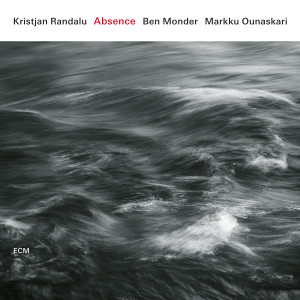 About two minutes into “Forecast 1,” the first track of Kristjan Randalu’s Absence, the Estonian pianist takes a brief pause after a gently improvised introduction, then leaps into a Lisztian whirlwind of arpeggios and it seems this is going to be a classical piece. Within moments, however, Finnish drummer Markku Ounaskari and American guitarist Ben Monder have joined in with contrapuntal yet swinging rhythm and blues-influenced colors, respectively, and you know it can be nothing but jazz.
About two minutes into “Forecast 1,” the first track of Kristjan Randalu’s Absence, the Estonian pianist takes a brief pause after a gently improvised introduction, then leaps into a Lisztian whirlwind of arpeggios and it seems this is going to be a classical piece. Within moments, however, Finnish drummer Markku Ounaskari and American guitarist Ben Monder have joined in with contrapuntal yet swinging rhythm and blues-influenced colors, respectively, and you know it can be nothing but jazz.
In a way it’s a capsule summary of Randalu’s biography. The son of two classical pianists, born in Estonia but raised in Germany, he grew up playing classical piano himself until he heard Chick Corea’s Inside Out when he was 13 years old. It changed everything, and he’s been composing and playing jazz, often with a classical influence, ever since.
For the most part you can’t classify the music on Absence as either-or, jazz or classical. Not surprising: In the past few months he has premiered new music of his own with the Tallinn Chamber Orchestra, performed Arvo Pärt’s Credo with Kristjan Järvi and the Konzerthausorchester Berlin, and duetted with avant garde saxophonist and flutist Dave Liebman.
This is the first time on record for these three musicians in this formation, although all three supported saxophonist Trygve Seim on his Helsinki Songs project. But they have a beautiful chemistry together.
The record’s track titles suggest a suite of some kind, with names like “Lumi I 1″ and Adaptation II 1.” About the first half of the record (in terms of number of tracks, since the first track is nearly 10 minutes long) could best be described as austere. Modernist jazz featuring a cool Northern European kind of sound that is sometimes modulated by Monder’s mostly clean guitar and wrangled into a structure by Ounaskari’s cymbals and occasional snare. On “Sisu 1” after a chilly introduction, Randalu picks out a bass line and then a bit of melody and develops it a bit for the remainder of the short piece. (With the exception of that long first track “Forecast 1” the bulk of the nine pieces are about three to six minutes.)
Then at the sixth track “Adaptation I 1.” something shifts dramatically. It opens with an industrial-sounding grinding overlaid with feedback, presumably from Monder’s guitar, maybe using something like an e-bow, plus cymbal washes and liberal application of floor toms and kick drum. Randalu’s delicate arpeggios seem warmer as they sketch out a melodic structure that fades after a brief three minutes.
The next two tracks are my favorites. “Adaptation II 1” moves from an opening hushed lyricism of interplay between guitar and piano, into a driving, fusion-like melodicism. Of course it goes off the rails (and I mean that in a good way!) in the final minute, Randalu seemingly playing in different rhythms with left and right hands, before coming to a delightful little conclusion. With Ounaskari’s delicate cymbal work and the quietly driving piano rhythm it’s almost programmatic and pastoral. The next track “Partly Clouded 1” is even more so, overtly melodic, dramatic and percussive in 6/8. Randalu plays with both hands on the left of the keyboard at times, forming a deep bed for Monder’s elusive picking. The two duet for a bit before Randalu picks up the lead for a very impressive bit of rapid keying, Ounaskari continually commenting on and helping to flesh out the piece.
Finishing Absence with the title track, the three restate the techniques and themes that form their tight relationship: Randalu playing a wistful, melodic lead, Monderadding subtle, flute-like long notes, and Ounaskari adding his own colors, largely on cymbals with a little snare. Many modern ensembles would lead off a recording with their most accessible work and gradually pivot to the more abstract. This trio chose just the opposite approach, making for a listening experience that perhaps mimics a range of emotional states in reaction to an absence: from confusion and frenetic activity to peaceful acceptance.
Listening to serious music, whether jazz or classical has always been a quest for those moments when you hear something that makes your heart leap with an “ah-ha!” feeling. In jazz those most often come with moments of improvisation when everything comes together in an unexpected but inevitable way. This trio’s work is full of moments like that.
(ECM, 2018)
More on Kristjan Randalu’s website.
